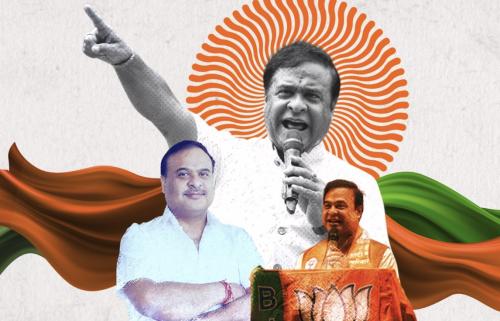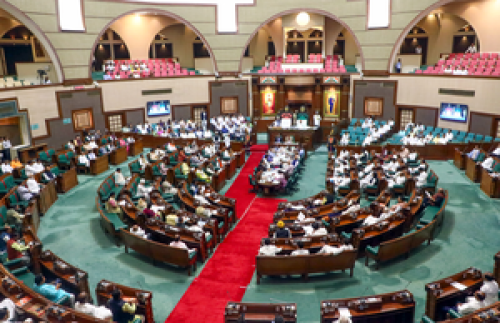By Shivaji Sengupta The well known political newsletter from Washington D.C., The Hill , defines infrastructure as the "the basic physical and organizational structures and facilities (e.g. buildings, roads, power supplies) needed for the operation of a society or enterprise." The qualifying part of the definition is "organizational." For in it, writes Sarah Grandholme the author, "we include, not only construction and administration of the physical structures, but also other agency's like health care, social work, education." It is interesting to see Sarah Grandholme beginning the definition with the traditional hardware stuff, but gradually transcending into its social aspects: "So we need roads, we need bridges, we need transmission, you need lights in people’s homes and offices, you need to make sure that people can actually go to work if they have an aging parent or a child,” she writes, adding that infrastructure "evolves to meet the people's aspirations." (The Hill). Notice, how she almost imperceptibly changes from the first person plural, "we" to the second person, "you," when she shifts from hardware (bridges, roads) to social needs like caring for aging parents and children. The transitional word, connecting hard and soft is the word "light" which is produced by both hardware and software (because, these days, illumination happens as a consequence of software interacting with hardware). In short, Ms. Grandholme's definition transcends the technical into the political. Traditionally, infrastructure is also intricately connected with economics. “Historically, it’s been what makes the economy move,” Granholm writes. Thus, so far, we have established a conceptual connection between infrastructure, the economy and social needs. Traditionally, social needs were not taken into account, in discussions on the infrastructure. Now, with Joe Biden as president, social needs have become as prominent as roads and bridges. That's what jumps out at us in his first Congressional speech as president. What is behind Joe Biden's view of the infrastructure - and Grandholme's - is the role of government in society. It's a far cry from Ronald Reagan who believed that "government is the problem." With his over two trillion dollars infrastructure proposal, President Biden has turned the famous Reagan aphorism on its head, seeking to empower the federal state as the catalyst to remake the country and revamp the balance between the richest and the rest. Who will benefit from roads, bridges and broadband the most, he asked rhetorically in his Congressional speech. Everybody, he said, answering is own question, but emphatically added that it is the poorer people who build the infrastructure, those who dig the roads, climb the electric poles, construction workers who build bridges that will benefit from what he called "American Jobs." With his eyes looking beyond the sparsely seated members of Congress, and straight into the eyes of the American people, many of whom are victims of Covid, the president announced that it was time to go beyond the wealthy and the rich, and give money, jobs, healthcare and family support to the ordinary people of America. He reiterated in his speech that the families plan includes $1 trillion in new spending and $800 billion in tax credits. It would finance universal prekindergarten for all 3- and 4-year-olds, a federal paid family and medical leave program, efforts to make child care more affordable, free community college for all, aid for students at colleges that historically serve nonwhite communities and expanded subsidies under the Affordable Care Act. The plan would also extend key tax breaks included as temporary measures in the coronavirus relief package that benefit lower- and middle-income workers and families, including the child tax credit, the earned-income tax credit, and the child and dependent care tax credit. And yes, it would increase taxes from 21% to 28% on those who make over $400,000 a year, as a means by which to partially pay for the proposed infrastructure. The Republicans do not like it. They would rather separate the traditional "hard" infrastructure from the "softer" social aspects. There point of view is simple: don't intentionally confuse the need for roads and bridges. But as Jennifer Rubin writes in The Washington Post, "There is only so much Republicans can do to distract from good times, yet it has not occurred to them that they might want to gain some credit for the expansion rather than cede all of it to Democrats." Lest we forget, soon after the American Rescue Act became law, did the Republicans not claim credit for the money their constituents received without them voting for it? If they decide to deny the administration any support for its historic infrastructure bill (which 64% of Americans support, and which, like the rescue plan, is popular with labor, mayors, governors, small business and more), it is common sense that Biden and the congressional Democrats will remind voters that the new bridge or the faster Internet or the new Veterans Affairs hospital would not exist if it were up to Republicans because no Republican voted for it. Nevertheless, the Republicans are pushing back. Caregiving is the most glaring example of how the White House expanded the traditional definition of infrastructure in its job proposal to include "human infrastructure" and "social infrastructure." Republicans argue Biden should have limited his legislative package to the repair of roads, bridges, railways and other physical infrastructure. "This plan is not about rebuilding America’s backbone," Senate Republican Leader Mitch McConnell said. In a singling out "$400 billion towards elder care," Sen. Marsha Blackburn, R-Tennessee, said flatly: "President Biden's proposal is about anything but infrastructure." In all this, the Republicans are missing a crucial connection. Democrats and advocates make a connection that Republicans don't. To Democrats, caregiving positions are "job-enabling jobs." As President Biden himself put it in his Congressional address, the U.S. economy can't thrive while many Americans, usually women, are forced to leave the workforce because they can't find caregivers for their loved ones. One survey found 1.4 million fewer mothers are working post-Covid. If you think about what roads, bridges, care and paid leave have in common – they all enable us to get to work," said Lisa Guide, co-founder of the Women Effect Action Fund, which advocates for women's equity. "The next period of American prosperity is going to be built on an economic recovery that enables all Americans, including women, to work hard and contribute to a growing economy." The $400 billion for caregiving would go to states through an expansion of Medicaid, making more funds available for home and community-based services in states that boost pay, offer paid leave and health care for caregiving workers, and meet other conditions. Biden's plan would also extend the Money Follows the Person program that moves disabled individuals out of institutions and back into their homes The proposed overhaul would effectively treat in-home care equal to institutional care under Medicaid, delivering on a long-held demand of advocates. The "care economy" would create an additional 1.5 million new caregiving jobs. When you realize that daily 10,000 people in America turn 65 years old, caregiving is the fastest growing industry in the nation, which represents 800,000 caregivers across 14 states. An estimated 4.7 million additional homecare workers will be needed in the next seven years. But Republicans and conservative groups criticize caregiving as a partisan add-on and balk at the proposed tax increases as they mount a united front against Biden's plan. "No reasonable definition of infrastructure includes expanding Medicaid benefits for long-term care or starting new social benefit programs," writes David Ditch of The Heritage Foundation. The rift between Democrats and Republican law makers and policy wonks directly affects a basic wish for bipartisan decision-making that Biden expressed several times in his inaugural speech on January 20. Republicans do not like the fact that, as long as Senator Joe Manchin votes for the Bill, Democrats may once again pass Biden's ambitious Bill without a single Republican vote Sen. Roy Blunt, R-Missouri, said it would be an easy win for the White House with Republican support if Biden axed the proposal to 30% of the total package, focusing only on roads, bridges, broadband and other traditional infrastructure. "This whole concept of, 'Well, we also need an infrastructure of care,' Blunt said in an interview on Fox News, "Obviously, Democrats have figured out that infrastructure is something we need and something that's popular, and so they're trying to take 70% of this bill and call it infrastructure in a new way than we've ever talked about infrastructure before." So we have, like many times before, given over the decision-making to those we helped get elected. It's no longer what we the people want. It is what they, the law makers, want. Do they want to hold back the structural and economic relief that we have so long waited for, bridges, roads, broadband, healthcare workers, and, thus, jobs, jobs, jobs? Or do we have to - once again - postpone those dreams, and take, piecemeal, what the rivaling parties, vying for power, give us? Think about it.
The President's Proposed Infrastructure Bill: What Does It Mean for America?
- by Rinku
- May 13, 2021 2 minutes

US President Joe Biden.(pics credit: twitter.com/POTUS)











